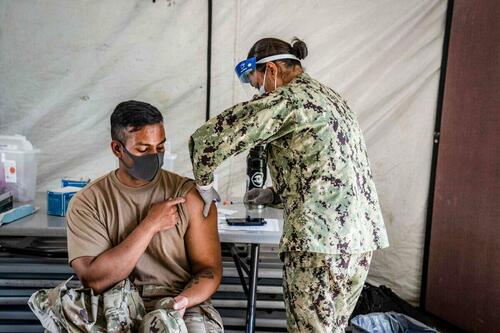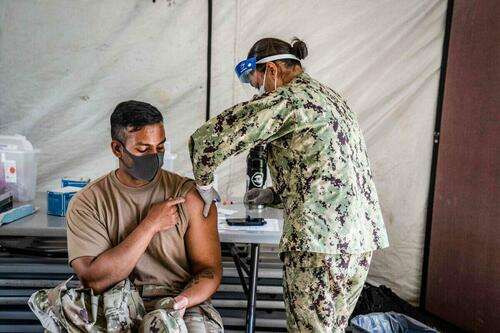The majority of service members kicked out over their refusal to get vaccinated received general discharges. With a general discharge, service members lose all educational benefits, reemployment rights, and civil service retirement credit.
Hayden Robichaux, donor relations coordinator for the Mighty Oaks Foundation, is one such service member. He had to build a career in the Marine Corps. He spent his initial two years serving as the military equivalent of a firefighter. But life as a Marine was interrupted by Secretary of Defense Lloyd Austin’s announcement of a COVID-19 vaccine mandate in August 2021, he told The Epoch Times.
Robichaux refused the vaccine and sought religious exemption.
“But it seemed like everybody who sought religious exemption was denied,” he said. Months later, a leaked June 2021 memo by the Pentagon watchdog revealed the department may have been violating standards in its process of denying religious exemption requests for the COVID-19 vaccine.
In addition to his religious conviction against the vaccine, he took objection to the fact that the only vaccines offered to service members at the time were labeled as authorized for emergency use, rather than having full FDA approval. This argument stems from the wording of the Pentagon’s vaccine mandate, which covers “COVID-19 vaccines that receive full licensure from the Food and Drug Administration (FDA), in accordance with FDA-approved labeling and guidance.” Robichaux and others believe that this means the mandate did not apply to any vaccines issued under emergency use authorization (EUA), such as the Pfizer-BioNTech vaccine.
They argue that the military mainly offered service members EUA Pfizer-BioNTech vaccine, rather than the FDA-approved Cominarty vaccine, and thus could not compel personnel to take them. They also argued that a Pentagon policy that says the Cominarty and EUA Pfizer-BioNTech vaccines are interchangeable was illegal.
“With each denial,” Robichaux said, “I kept putting in appeals and each was denied; they were brushed off.” As he continued to refuse the vaccine, he said his leadership became “pissed.” In October 2021, he was given 10 days to get the jab. He soon faced the threat of Article 15, a form of nonjudicial punishment that can be imposed by a commander, that would “put a stain” on his career.
“Because of this,” he said, “I almost changed my mind, telling them that I was going to get it.” Members of his immediate family have collectively served in the military for over 80 years since the Vietnam War. “And I wanted to continue the legacy that we have under our name,” he said.
In the end, Robichaux maintained his religious objection to the vaccine and did not take it. Not only did he receive an Article 15, but he was also denied a promotion to corporal. While he admits he may have disobeyed the command to take the vaccine, he said, “I don’t believe it was a lawful command, as I should have never been forced to take an EUA product.”
Robichaux was discharged from the Marine Corps in February 2022. “My commanding officer recommended me for an honorable discharge, but once it went up the chain of command, it came back as a general discharge,” he said. His discharge was characterized as being connected to the commission of a serious offense. Domestic battery, murder, rape, terrorism, and drug use are considered typical commissions of a serious offense.
Since leaving the Marine Corps, he said, “I’ve only met one person that received an honorable discharge.” This, he said, is concerning when one considers the thousands of service members who were separated from the military. One day, Robichaux would like to have his discharge upgraded.
More of the Same
The Epoch Times also spoke to Private First Class Derrick Wynne, who joined the Army in July 2020. Nearly two years later, he was discharged from service for refusing to take the COVID-19 vaccine once mandated by Defense Secretary Austin.
Wynne described himself as a “hard refusal,” as he didn’t apply for an exemption. He refused because “they were offering vaccines issued under emergency use authorization,” which he considered as legally distinct from the fully FDA-approved vaccines service members were mandated to take.
Read more here…









